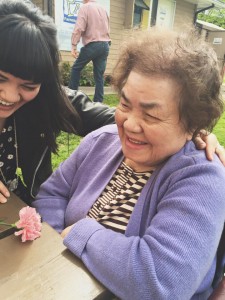My earliest memory of home was in 1998. We lived in a modest house in Coquitlam then, two stories, three bedrooms, with different coloured carpet in every room. The backyard was small and overgrown, and on the days that we weren’t busy building cities with lego or running around the block, my brother and I would sit in the grass and watch our neighbour’s sattelite dish swivel slowly back and forth. I was 5 then, too young to really understand the difference between home and not-home, but I know I felt a soreness when I stayed overnight at my aunt’s house, this longing for something that I didn’t understand. I’d cry (as kids do) for my mother. But really, what I was crying for was home.
A year later, my parents split up and we moved from the house I called home. My grandma, my mom, my brother and I moved into an apartment on the other side of Coquitlam. Then two years after that, we moved into a townhouse just down the street from the apartment. Fast forward five years, and we moved into a new house, this time with my Stepdad, a place I felt was home for many years. After that, home was constantly changing for me: a dorm room, a suite with roommates, a subleased studio apartment. Now, home is a comfortable apartment in Vancouver, a place I’ve shared with my partner for almost two years.

Our little home.
After moving as many times as I have, I realize that home was never the house I lived in. I never felt I had enough time to really lay down roots in any specific place. Instead, home has to do with history. The places I feel at home are the places I’ve grown into (neighbourhoods, cities, libraries and coffee shops), the people I’ve grown with. Or, more accurately, home is where I’ve let myself grow. Home is about the rituals I perform, the person I live with, the feeling I get when I walk in the door. Home is comfort, safety, and the knowledge that the place that I am, here and now, is a place where I can be honest and unedited without fear of judgment or scrutiny.
It’s been a challenge letting myself get attached to any one place or person, so really accepting anywhere or anyone as an emblem of “home” is monumental for me. I think this is common with children from less-than-perfect homes. My parents split up when I was very young and then my dad moved to Thailand and disappeared for most of my life. This sounds like a sad thing but really it’s a whatever thing. I was young when it happened and quickly got over it. However, it did make me more practical (read as: hardheaded) when it comes to relationships. As a rule, I tend to assume the worst out of every scenario before I prove myself wrong. So many times I’ve pushed against the idea of making any place or person home because I know of the impermanence and unreliability of these things, but often the idea finds its way into my head. While I always felt like this was a good thing, I realize now (as I’m getting older and letting myself be a little bit more vulnerable in relationships), that being hardened is a really good way to feel isolated and lonely. Malleability and bonding are important. Who would’ve thought?

Laughing with my beautiful Nanay.
I’m lucky to have a large, close-knit family on my mother’s side. Culturally, Filipino families are like that: intimate, absolutely nuts, and full of love. I always had support, even through my dark, don’t-go-near-me days. And while I’ve struggled with my cultural identity (being half-Filipino and half-Dutch), I still feel like eating Pancit and Ginataang Bilo-Bilo with my Nanay has always been home to me.
Works Cited:
Estrella, Serna. “The History of Pancit.” Pepper.ph. N.p., 19 May 2014. Web. 5 June 2015.
Lalaine. “Ginataang Bilo Bilo.” Kawalingpinoy.com. N.p., 17 Feb. 2015. Web. 5 June 2015.
Melissa,
I think a lot of people in our generation have accepted the transitional nature of “home”, as you seem to in your story. It’s true that the emblematic home (as you phrased so eloquently) is very hard to pin down these days.
Even though my mom lives in my grandfather’s house (and it’s the house I grew up in), I still wouldn’t consider that place my home because I don’t list it as my “home address.” It is her home and may one day be mine, but I don’t call it home now.
Thanks for sharing – your story really resonated with me!
-J
🙂
Hey Melissa,
I really conected with the words in your blog – I have a smimilar background as you; a slit up family all over the place, and have lived in so many place, though there is still so much love that can be found through all the people involved in our life experiences! I agree with becoming vulnerable in relationships, and allowing yourself to be open and willing to fully be involved with others. I find that people who can do that through the ups and downs in life are the strongest of people because they let love in no matter what, and leave room for growth in their lives!
🙂